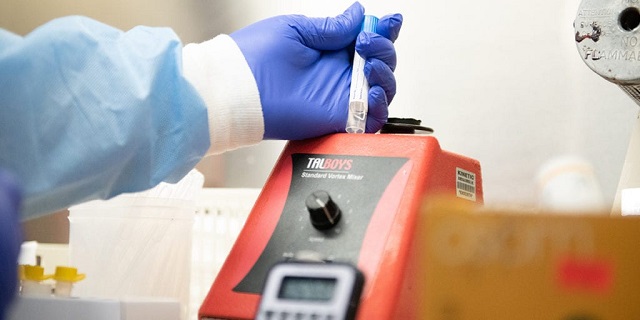Can COVID-19 Cause a Heart Attack?

February 15, 2021
You may think of COVID-19 as a disease that involves the lungs, since many people experience shortness of breath or trouble breathing, but a growing body of research shows that COVID-19 can attack the heart, as well.
Researchers are discovering that a significant number of people who recover from COVID-19 have heart damage caused by the virus due to inflammation, even those whose illnesses were mild enough for them to avoid going to the hospital.
In one German study, 76 percent of people with COVID-19 showed evidence of biomarker damage to their hearts that was similar to damage caused by heart attacks. COVID-19 was also found to cause ongoing inflammation of the heart muscle in 60 percent of people who recovered from the virus. Researchers believe that the inflammation may lead to heart failure in a portion of the population that was previously healthy.
Other research has shown that COVID-19 may increase the risk of blood clots, which may cause heart damage or heart attacks in some people. (The researchers suggest that prescribing blood thinners to certain COVID-19 patients may help to lower the risk of complications like these.)
Who is at risk?
People who are 65 and older or those with chronic health conditions may be at increased risk of heart complications from COVID-19 infection, but younger, healthier people may also be affected.
Researchers are still learning about COVID-19. It’s unknown if hearts may recover from inflammation or related damage, which may happen after inflammation caused by other viral infections.
It’s also unknown if people who have had milder cases of COVID-19, who haven’t been treated by a doctor, might benefit from screening exams to assess their heart health.
“More research needs to be done before any recommendations are made to do heart screenings of all patients who have had COVID-19,” says David Landers, M.D., vice chair, Heart & Vascular Hospital at Hackensack University Medical Center.. “If you are experiencing worrisome symptoms, like chest pain, shortness of breath, heart palpitations or swollen ankles, call your doctor or seek emergency care.”
Seeking care for possible heart attacks
During the pandemic, some people have avoided going to hospitals for emergency care, out of fear of being exposed to COVID-19 in the emergency room. If you’re experiencing signs of a heart attack, it’s urgent to get to the hospital quickly, to get the care that you need.
If you think that you’re having a heart attack, don’t drive to the hospital; call 911. Emergency medical responders can begin to give you critical care when they arrive at your home, and you should be seen in the emergency room more quickly if you arrive by ambulance.
“If you think that you’re having a heart attack and you’ve recovered from COVID-19, you or your family members should mention this detail to the EMTs and the doctors in the emergency room,” says Dr. Landers.
Symptoms of a heart attack
These are common symptoms of a heart attack:
- pain or pressure in the chest lasting a few minutes
- pain in the back, neck, jaw or one or both arms
- feeling short of breath
- sweating
- feeling lightheaded
- nausea
All heart attack patients may experience the above symptoms. However, the symptoms experienced by older patients and women may be limited to:
- shortness of breath
- nausea and vomiting
- severe and unexplained fatigue
“Anyone who thinks that they’re having a heart attack should call 911 quickly, especially if they may have sustained damage to the heart from COVID-19,” says Dr. Landers.
Next Steps & Resources:
- Meet our source: David Landers, M.D.
- To make an appointment with Dr. Landers, or a doctor near you, call 800-822-8905 or visit our website.
The material provided through HealthU is intended to be used as general information only and should not replace the advice of your physician. Always consult your physician for individual care.
Find a doctor near me
The New Variants of COVID-19, Explained

The Centers for Disease Control and Prevention has reported that people within the United States are now becoming infected with two new variants of the SARS-CoV-2 virus.
Can You Get COVID-19 Twice?

Some diseases, like measles, can only infect us once. What about COVID-19?
Find a doctor near me

How to Prepare for Your COVID-19 Vaccine
You’re probably already daydreaming about the things that you’ll do once you’re fully vaccinated, but have you considered what to do to get ready for your appointment?

Five Tips for a Healthier Workout
Three of our cardiologists share how to fit heart healthy exercise into even the busiest schedules.

What Can You Do After You’re Fully Vaccinated Against COVID?
There are advantages to getting fully vaccinated against COVID-19.

Surprising Signs You May Be Having a Heart Attack
When people have heart attacks in movies, they usually clutch their chests dramatically, break out in a cold sweat and drop to the floor. In real life...
